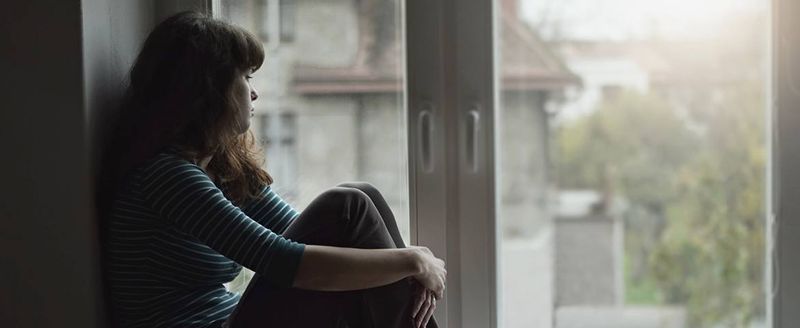In the midst of our varied responses to the coronavirus pandemic and lockdown – responses that range from apathy to anger – it’s easy to forget those who are normally neglected under the best circumstances, including people who live with or around some form of mental illness. For many of them, this current combination of isolation and uncertainty can generate or exacerbate conditions such as depression, paranoia, and anxiety.
Isolation
The lockdown has provided all of us with challenges. For some, these amount to little more than inconveniences, remembering today’s date or finding a tutorial for cutting one’s hair. For others, though, a period of forced isolation can be much more destructive. This has been commonly understood throughout history. Already in the 15th century, King Duarte of Portugal, well acquainted with melancholy in his own life, wrote that anyone affected by this condition should “take great care not to be alone.”[1]
Martin Luther repeated the same advice in a number of occasions. For example, he told the wife of Jonas von Stockhausen, captain of the town of Nordhausen, not to leave her husband “alone for a single moment, and leave nothing lying around with which he can harm himself. Solitude is poison to him.”[2]
Modern psychology teaches the same. And yet, many people to whom “solitude is poison” are now forced to be alone, often with free access to potentially harmful objects or substances. In fact, legal marijuana and alcohol are often seen as an easy fix by those who can’t cope in other ways.
Uncertainty
“What is going on is very hard with mental illness, especially for those that struggle with thoughts not connected to reality,” Coleen Coren Sharp, host of the podcast Theology Gals, told me. “My bipolar son had a manic episode when everything started. He was convinced this was the end of civilization. He’s become obsessive about social distancing. I’ve also seen people with mental illness buying into conspiracy theories obsessively.” Her second son, who lives with OCD, is also struggling at a time when disinfection from germs and hand-washing have reached obsessive levels in many people.
Some concerns are common and even justified. A friend told me that her husband, who is struggling with depression, “thinks this economic situation will destroy his work” and that the family “will lose everything.” While these fears are not completely unwarranted, they have escalated to the point that they are causing him great anxiety and depriving him of sleep – so much that she is more concerned about his mental health than anything else.
Some forms of anxiety, she is now discovering, can’t be sorted out by logical reasoning. “He loves the Lord and knows his thinking is not reasonable,” she told me. “yet it is consuming him.”
Reaching Out
When we think of people at greatest risk during this pandemic, we must not forget those who live with a mental illness, who often need company, reassurance, and someone who sincerely cares for their wellbeing. If they live alone, we should make sure they have enough healthy food and are taking care of their health. Some of them might be too afraid of germs to go to a store, or might fear calling a doctor if they develop symptoms of the virus.
If physical contact is not possible, we can still call, text, or email, and let them know we are there for them. And then we should really be there, offering to shop for them, sending gift certificates for restaurants that deliver at home, or giving them our number so they can call if they need to talk. As my former pastor used to tell us, we should be ready to be inconvenienced for others.
If they live nearby, we can invite them to go out for a healthy walk, while keeping the recommended distance, or get them involved in useful activities. “My support group and I are actively looking for ways to be of service to others,” my friend Ed told me. “Our belief is that extending love to others keeps us out of our heads. And it is absolutely imperative to stay in physical motion, doing some good. One of our slogans is, ‘Depression can’t hit a moving target.’”
Another friend, who has been living with bipolar disorder and depression for some time, seconded this assessment. “I know that when I spend too much of my time indoors, the lack of vitamin D and the enclosed nature of a room and especially that of a bed can exacerbate the depression. Our first impulse is to sequester ourselves and hide and that is exactly what we don’t need.”
A Safe Environment
If someone struggling with anxiety lives with us, we can try to build a positive, uplifting atmosphere in the home, limiting the news to specific times and accredited sources. These are good measures for everyone, with or without a mental illness. “These are really difficult times,” David Peters, MFT in San Diego, CA, told me, “and we can easily lose hope, or get drowned in anger. Just get your daily dose of accurate information, perhaps online, at a major news outlet that doesn’t cloud up the story with debates. After that, no more news that day.”
We can instead take advantage of the lockdown to create peaceful mealtimes where we can enjoy good food and healthy laughter, read some Scriptures and pray. We can also encourage each other to listen to sermons and uplifting music throughout the day. I have been doing it for years, when I drive, clean the house, or when I wake up at night. It’s a great antidote against negative thoughts.
In some circumstances, this is easier said than done. Coleen found that talking to her oldest son during a manic episode only causes him more anxiety. She has learned to wait and reason with him later, “loving him, being there, making sure he knows I’m here. Like parenting in general, wisdom is necessary.”
And the church should be there for both those who live with mental illness and those who live directly around it. Until in-person visitations can be resumed, elders and deacons can engage in regular call or Zoom visitations. Pastor Henry Fernandez, of Bryce Avenue Presbyterian Church in White Rock, NM, says that each of their elders have been assigned to some families, in order to connect with them by phone or otherwise. “Needs are being met in a practical fashion, like going to the grocery store to pick up food, etc. for people with compromised immune systems. And those with various emotional struggles are being called, prayed for, and encouraged on a regular basis.”
This kind of care is taking place in many churches all over the world. May it continue during this time of pandemic, for the love of God, for the love of neighbor, for the love of those for whom solitude is proving to be particularly poisonous.
Simonetta Carr is the author of numerous books, including Broken Pieces and the God Who Mends Them: Schizophrenia through a Mother’s Eyes, and the series Christian Biographies for Young Readers (Reformation Heritage Books).
[1] Duarte, Leal Conselheiro (E.M. Portugal, 1841), p. 135.
[2] Martin Luther, Luther: Letters of Spiritual Counsel, ed. by Theodore G. Tappert (Regent College Publishing), 2003.




